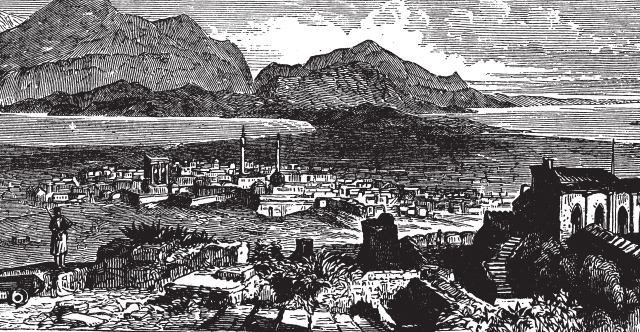
1
N
ow about food offered to idols: of course we know that all of us possess knowledge knowledge causes people to be puffed up (to bear themselves loftily and be proud), but love (affection and goodwill and benevolence) edifies and builds up and encourages one to grow.
Për sa u përket flijimeve për idhujt, ne e dime se të gjithë kemi njohuri; njohuria krekos, kurse dashuria ndërton.
2
I
f anyone imagines that he has come to know and understand much, he does not yet perceive and recognize and understand as strongly and clearly, nor has he become as intimately acquainted with anything as he ought or as is necessary.
Në qoftë se dikush mendon se di diçka, ai nuk di ende asgjë sikundër duhet të dijë.
3
B
ut if one loves God truly '> with affectionate reverence, prompt obedience, and grateful recognition of His blessing], he is known by God '> recognized as worthy of His intimacy and love, and he is owned by Him].
Por në qoftë se dikush e do Perëndinë, ai është i njohur prej tij.
4
I
n this matter, then, of eating food offered to idols, we know that an idol is nothing (has no real existence) and that there is no God but one.
Pra, për sa i përket të ngrënit të flive që u bëhen idhujve, ne e dimë se idhulli nuk është asgjë në botë dhe se nuk ka Perëndi tjetër, veç një.
5
F
or although there may be so-called gods, whether in heaven or on earth, as indeed there are many of them, both of gods and of lords and masters,
Sepse, ndonëse ka të ashtuquajtura perëndi në qiell a në tokë (sikurse ka shumë perëndi dhe shumë zotër),
6
Y
et for us there is one God, the Father, Who is the Source of all things and for Whom we, and one Lord, Jesus Christ, through and by Whom are all things and through and by Whom we.
për ne s’ka veçse një Perëndi, Ati nga i cili janë të gjitha gjërat dhe ne në të; dhe një Zot, Jezu Krishti, me anë të të cilit janë të gjitha gjërat, dhe ne jetojmë me anë të tij.
7
N
evertheless, not all possess this knowledge. But some, through being all their lives until now accustomed to idols, still consider the food as that sacrificed to an god; and their weak consciences become defiled and injured if they eat.
Por njohuria nuk është në të gjithë; madje disa, të ndërgjegjshëm për idhullin, hanë gjëra posi të flijuara idhujve; dhe ndërgjegja e tyre, duke qenë e dobët, përlyhet.
8
N
ow food will not cause our acceptance by God nor commend us to Him. Eating gives us no advantage; neither do we come short or become any worse if we do not eat.
Por të ngrënit nuk na çon te Perëndia; po të hamë, nuk fitojmë asgjë më tepër dhe, po të mos hamë, s’kemi gjë më pak.
9
O
nly be careful that this power of choice (this permission and liberty to do as you please) which is yours, does not become a hindrance (cause of stumbling) to the weak or overscrupulous.
Por kini mendjen se mos kjo liri që keni të bëhet pengesë për të dobëtit.
10
F
or suppose someone sees you, a man having knowledge reclining at table in an idol’s temple, might he not be encouraged and emboldened if he is weak and uncertain, and eat what is for the purpose of idol worship?
Sepse, në qoftë se dikush të sheh ty, që ke njohuri, të ulur në tryezë në një tempull idhujsh, ndërgjegja e tij, që është e dobët, a nuk do të marrë guxim që ai të hajë gjërat e flijiuara për idhujt?
11
A
nd so by your enlightenment (your knowledge of spiritual things), this weak man is ruined (is lost and perishes)—the brother for whom Christ (the Messiah) died!
Edhe kështu, për shkak të njohurisë sate, do të humbasë vëllai yt i dobët, për të cilin vdiq Krishti.
12
A
nd when you sin against your brethren in this way, wounding and damaging their weak conscience, you sin against Christ.
Dhe, kur mëkatoni kështu kundër vëllezërve, duke plagosur ndërgjegjen e tyre të dobët, ju mëkatoni kundër Krishtit.
13
T
herefore, if food is a cause of my brother’s falling or of hindering, I will not eat flesh forever, lest I cause my brother to be tripped up and fall and to be offended.
Prandaj, në qoftë se një ushqim skandalizon vëllanë tim, unë nuk do të ha më kurrë mish, që të mos e skandalizoj vëllanë tim.
 English
English
 Albanian - Shqip
Albanian - Shqip
 Arabic - العربية
Arabic - العربية
 Bulgarian - Български
Bulgarian - Български
 Chinese - 汉语
Chinese - 汉语
 English - English
English - English
 French - Français
French - Français
 German - Deutsch
German - Deutsch
 Italian - Italiano
Italian - Italiano
 Māori - Te Reo Māori
Māori - Te Reo Māori
 Portuguese - Português
Portuguese - Português
 Romanian - Română
Romanian - Română
 Russian - Русский
Russian - Русский
 Somali - Af Soomaali
Somali - Af Soomaali
 Spanish - Español
Spanish - Español
 Ukrainian - Українська
Ukrainian - Українська
 Vietnamese - Tiêng Viêt
Vietnamese - Tiêng Viêt
 Albanian
Albanian
 Albanian - Shqip
Albanian - Shqip
 Arabic - العربية
Arabic - العربية
 Bulgarian - Български
Bulgarian - Български
 Chinese - 汉语
Chinese - 汉语
 English - English
English - English
 French - Français
French - Français
 German - Deutsch
German - Deutsch
 Italian - Italiano
Italian - Italiano
 Māori - Te Reo Māori
Māori - Te Reo Māori
 Portuguese - Português
Portuguese - Português
 Romanian - Română
Romanian - Română
 Russian - Русский
Russian - Русский
 Somali - Af Soomaali
Somali - Af Soomaali
 Spanish - Español
Spanish - Español
 Ukrainian - Українська
Ukrainian - Українська
 Vietnamese - Tiêng Viêt
Vietnamese - Tiêng Viêt
